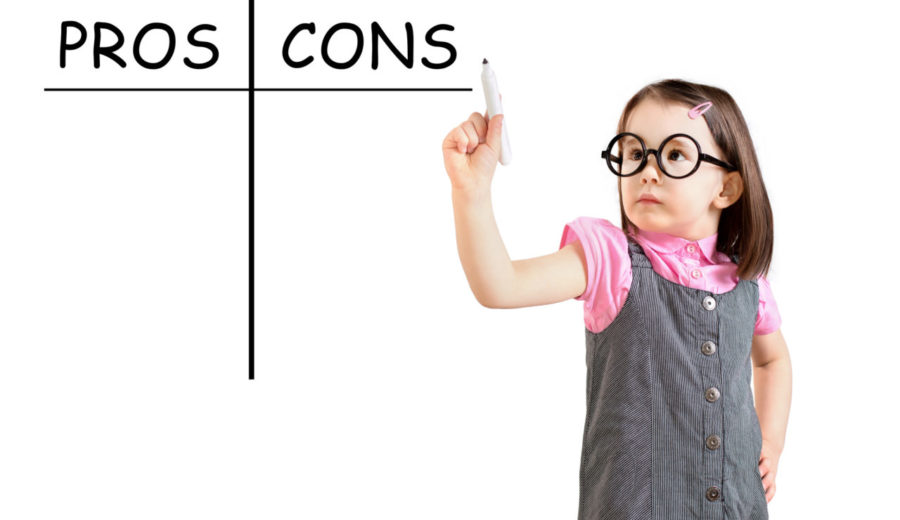When it comes time to make a decision about care for your child you may be unsure about which choice will be best for your family. Some families decide that daycare is the ideal option for their circumstances, while others rely on family members or in-home caretakers. Often, preschool is the go-to choice for families, as is evidenced by the 75% of young children in the U.S. who participate in preschool programs.
But is preschool right for your family right now? Today’s post delves into some of the pros and cons of preschool options with the intention of helping you to make an informed decision about one of the most important choices for you and your child.
The Pros of Preschools For Young Children
Opportunities for social development
Preschool children have the chance to interact with others their own age in a way that cannot easily be replicated at home. The activities that preschools offer promote social skill development in a variety of ways. Preschool children also gain the opportunity to interact with trusted teachers and other adults, allowing them to form bonds and relationships above and beyond the parental relationship..
Grade school readiness
Undoubtedly, preschools offer an environment unlike any other childcare arrangement. They promote classroom learning and can help foster childhood development — the physical and mental skills participants need to be successful students. The exposure to new experiences in an environment designed for growth is, without a doubt, one of the top benefits of choosing a preschool.
Easier transitions
When children do not attend preschool, they may find the transition from day care or home care into pre-K or kindergarten to be much more stressful. By enrolling your child in preschool, they’ll become much more accustomed to independence and healthy separation. And because preschools provide more structure than other childcare programs might, this makes transitions much easier.
Safe environment
The truth is that you can’t watch your child like a hawk every single moment. And if you aren’t secure in the knowledge that another childcare provider will be able to offer the watchful eye you require, you cannot guarantee your child will be safe. Preschool classrooms must conform to strict regulations in order to ensure safety, while preschool teachers need to undergo background checks and training to meet the school’s standards. When you enroll your child in a reputable preschool program, you are ensuring their safety.
The Cons of Preschools For Young Children
Less one-on-one time
As a parent, you’ll have to come to terms with the fact that you won’t be spending quite as much time with them during school hours. However, you’ll still have plenty of time to share with your child! Other parents may fear that because preschool classrooms are bound to have more children than adults, their child will not benefit from personalized attention. One-to-one time may be scarce at preschool, which is why some parents wait to enroll their children. But interaction with their peers and as a group can be just as important.
Separation anxiety
Many children (and parents, too!) struggle with separation anxiety. This really depends on the child and the parents. You may be surprised what a difference a year makes. If separation anxiety is of particular concern for your family, you may want to explore other options until your child feels truly ready. Be sure to carefully and objectively look at the rational reasons why your child may not be ready. Often the child is ready but the parents are not.
Less flexibility
Typically, preschools for young children offer specific hours of instruction and care. Daycares and home care situations are generally a bit more flexible. The latter may appeal to families who work long hours or who need a less stringent care schedule. This is an important factor to consider when choosing between preschool versus daycare versus a nanny.
Costs
Costs vary from preschool to preschool. However, preschools don’t always cost more than other options; it really depends on the facility and the area, among other factors. If cost is a major component of choosing a childcare option, it’s important to conduct thorough research before making a final decision. You might actually learn that a preschool can be more affordable in the long term.
Always keep in mind that the price is not always indicative of the quality of care and education. Be sure to ask around and look at online reviews and social media groups to find out what the community thinks about the school you are considering. A quality preschool experience is not about the biggest and best facility with all of the “toys”, but rather what do you feel when you meet the teachers and director. As corny as it may sound, if you do not feel the warmth and love on a visit, cross it off your list.
Additional Help
Deciding on a preschool — and determining whether preschool is even right for your family — isn’t an easy decision. But we’re here to help. Contact us today to learn more about how we can provide the programs your family needs.




